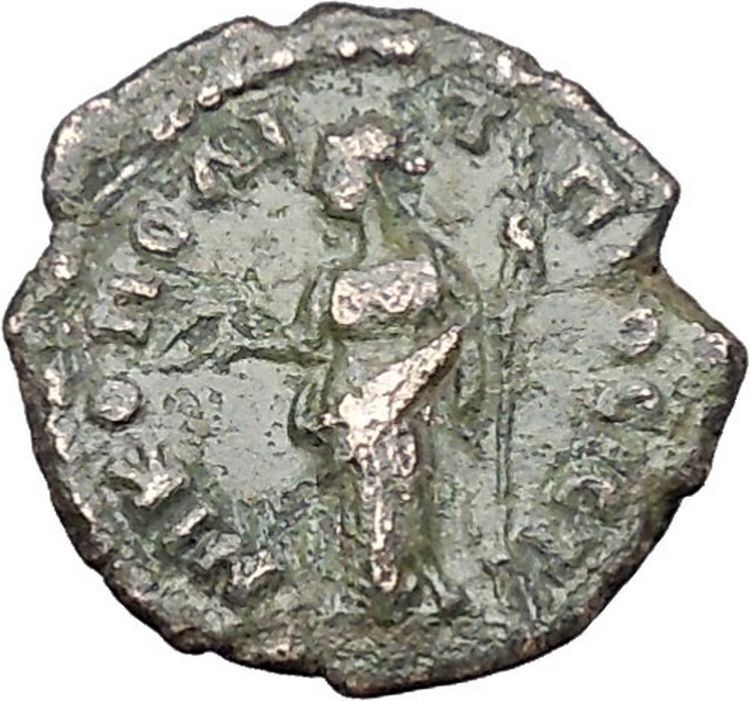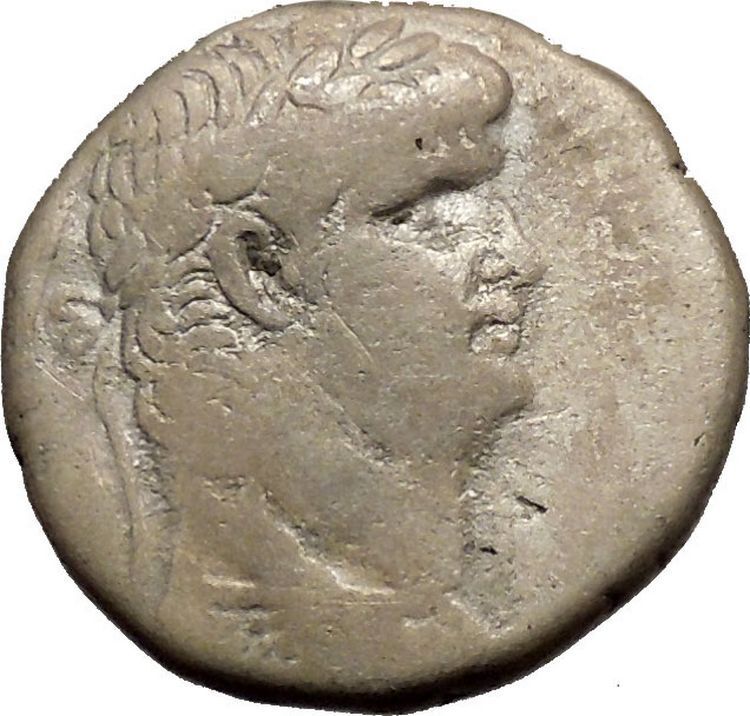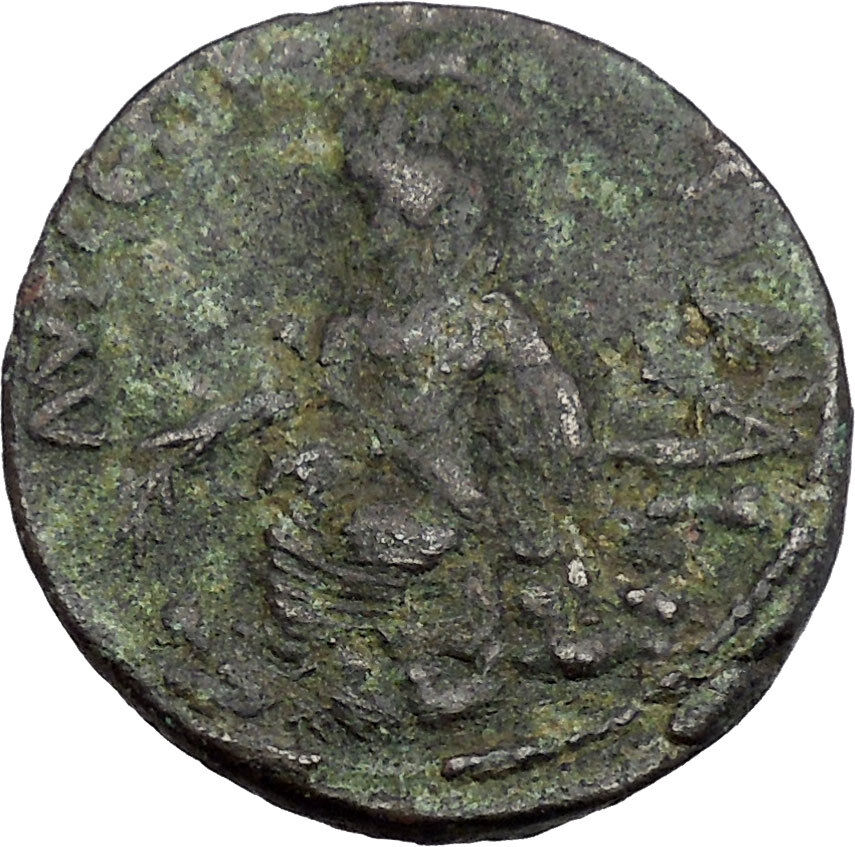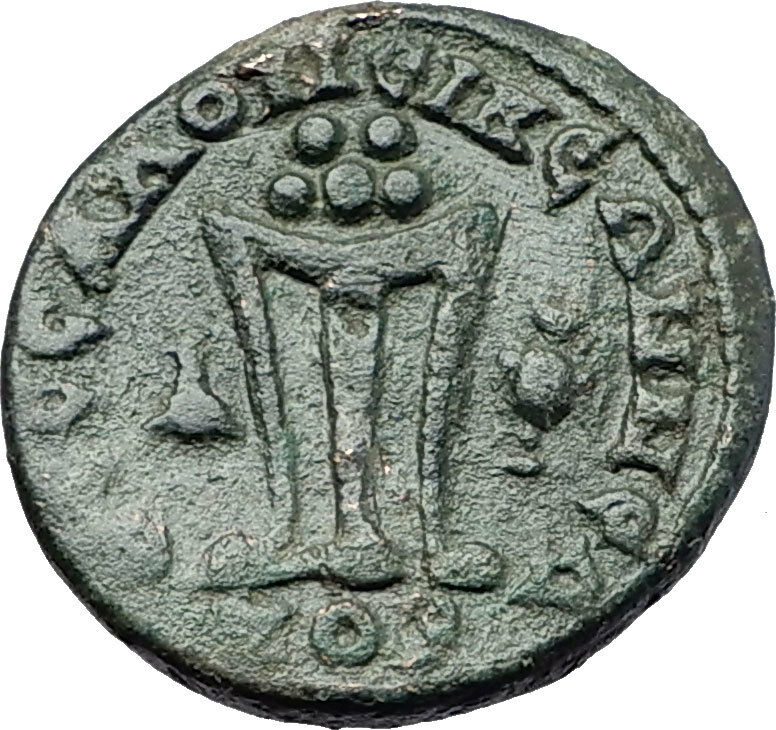|
Marcus Vipsanius Agrippa
– best friend of Augustus & General Died 12 B.C.
Bronze 20mm (4.97 grams) of
Odessos
in
Thrace
Bare head of Marcus Vipsanius Agrippa right.
ΟΔΗΣΙΤ, Cornucopia, bunch of grapes to left, all
within oak wreath.
* Numismatic Note: RRR! coin. Although it is not certain who
is on the obverse of this coin. However, if you compare it to a similar issue of
Augustus (RPC 1801; Varbanov GIC I 4270) with a similar reverse type from the
mint, but the features of Augustus. So this dates this coin to the time of
Augustus. So the most likely conclusion that can be made for this coin is that
it is of Agrippa during a very early period in the reign of Augustus.
You are bidding on the exact item pictured,
provided with a Certificate of Authenticity and Lifetime Guarantee of
Authenticity.

Marcus
Vipsanius Agrippa (c.
63 BC–12 BC) was a Roman statesman and general. He was a close friend,
son-in-law, lieutenant and
defense minister
to Octavian, the future emperor Caesar
Augustus
.
He was responsible for most of Octavian’s military victories, most notably
winning the naval
Battle of Actium
against the forces of
Mark
Antony
and
Cleopatra VII of Egypt
.
He was the son-in-law of the Emperor Augustus, maternal grandfather of the
Emperor Caligula
, father-in-law of the Emperor
Tiberius
and the Emperor Claudius
, and maternal great-grandfather of the Emperor
Nero.
//
Early
life
Agrippa was born between 23 October and 23 November in 64–62 BC in an
uncertain location. His father was perhaps called
Lucius Vipsanius Agrippa
. He had an elder brother whose name was also Lucius
Vipsanius Agrippa, and a sister named
Vipsania Polla
. The family had not been prominent in Roman public life.
However, Agrippa was about the same age as
Octavian
(the future emperor Augustus), and the two were educated together and became
close friends. Despite Agrippa’s association with the family of
Julius Caesar
, his elder brother chose another side in the
civil wars
of the 40s BC, fighting under
Cato
against Caesar
in Africa
.
When Cato’s forces were defeated, Agrippa’s brother was taken prisoner but freed
after Octavian interceded on his behalf.
It is not known whether Agrippa fought against his brother in Africa, but he
probably served in Caesar’s campaign of 46–45 BC against
Gnaeus Pompeius
,
which culminated in the
Battle of Munda
.
Caesar regarded him highly enough to send him with Octavius in 45 BC to study in
Apollonia
with the
Macedonian
legions
,
while Caesar consolidated his power in Rome. It was in the fourth month of their
stay in Apollonia that the news of Julius Caesar’s
assassination
in March 44 BC reached them. Despite the advice of Agrippa and
another friend,
Quintus
Salvidienus Rufus
, that he march on Rome with the troops from Macedonia,
Octavius decided to sail to Italy with a small retinue. After his arrival, he
learnt that Caesar had adopted him as his legal heir. (Octavius now took over
Caesar’s name, but is referred to by modern historians as “Octavian” during this
period.)
Rise
in power
After Octavian’s return to Rome, he and his supporters realized they needed
the support of legions. Agrippa helped Octavian to levy troops in
Campania
.
Once Octavian had his legions, he made a pact with
Mark
Antony
and
Lepidus
, legally established in 43 BC as the
Second
Triumvirate
. Octavian and his consular colleague
Quintus Pedius
arranged for Caesar’s assassins to be prosecuted in their absence, and Agrippa
was entrusted with the case against
Gaius Cassius Longinus
. It may have been in the same year that Agrippa began
his political career, holding the position of
Tribune of the Plebs
, which granted him entry to the
Senate
.
In 42 BC, Agrippa probably fought alongside Octavian and Antony in the
Battle of Philippi
. After their return to Rome, he played a major role in
Octavian’s war against
Lucius Antonius
and
Fulvia Antonia
, respectively the brother and wife of Mark Antony, which
began in 41 BC and ended in the capture of
Perusia
in 40
BC. However,
Salvidienus
remained Octavian’s main general at this time. After the
Perusine war, Octavian departed for
Gaul
,
leaving Agrippa as
urban praetor
in Rome with instructions to defend Italy against
Sextus Pompeius
, an opponent of the Triumvirate who was now occupying
Sicily
. In
July 40, while Agrippa was occupied with the
Ludi
Apollinares
that were the praetor’s responsibility, Sextus began a raid in
southern Italy. Agrippa advanced on him, forcing him to withdraw. However, the
Triumvirate proved unstable, and in August 40 both Sextus and Antony invaded
Italy (but not in an organized alliance). Agrippa’s success in retaking
Sipontum
from Antony helped bring an end to the conflict. Agrippa was among
the intermediaries through whom Antony and Octavian agreed once more upon peace.
During the discussions Octavian learned that Salvidienus had offered to betray
him to Antony, with the result that Salvidienus was prosecuted and either
executed or committed suicide. Agrippa was now Octavian’s leading general.
In 39 or 38 BC, Octavian appointed Agrippa governor of
Transalpine Gaul
, where in 38 he put down a rising of the
Aquitanians
.
He also fought the
Germanic tribes
, becoming the next Roman general to cross the
Rhine
after
Julius Caesar
. He was summoned back to Rome by Octavian to assume the
consulship
for 37 BC. He was well below the usual minimum age of 43, but
Octavian had suffered a humiliating naval defeat against Sextus Pompey and
needed his friend to oversee the preparations for further warfare. Agrippa
refused the offer of a
triumph
for his exploits in Gaul – on the grounds, says
Dio
,
that he thought it improper to celebrate during a time of trouble for Octavian.
Since Sextus Pompeius had command of the sea on the coasts of Italy, Agrippa’s
first care was to provide a safe harbor for his ships. He accomplished this by
cutting through the strips of land which separated the
Lacus Lucrinus
from the sea, thus forming an outer harbor, while joining the
lake Avernus
to the Lucrinus to serve as an inner harbor. The new harbor-complex
was named
Portus Julius
in Octavian’s honour. Agrippa was also responsible for
technological improvements, including larger ships and an improved form of
grappling hook.
About this time, he married
Caecilia Pomponia
Attica
, daughter of
Cicero
‘s friend
Titus Pomponius Atticus
.
In 36 BC Octavian and Agrippa set sail against Sextus. The fleet was badly
damaged by storms and had to withdraw; Agrippa was left in charge of the second
attempt. Thanks to superior technology and training, Agrippa and his men won
decisive victories at
Mylae
and
Naulochus
,
destroying all but seventeen of Sextus’ ships and compelling most of his forces
to surrender. Octavian, with his power increased, forced the triumvir Lepidus
into retirement and entered Rome in triumph. Agrippa received the unprecedented
honor of a
naval
crown
decorated with the beaks of ships; as Dio remarks, this was “a
decoration given to nobody before or since”.
Life
in public service
Agrippa participated in smaller military campaigns in 35 and 34 BC, but by
the autumn of 34 he had returned to Rome. He rapidly set out on a campaign of
public repairs and improvements, including renovation of the
aqueduct
known as the
Aqua
Marcia
and an extension of its pipes to cover more of the city. Through his
actions after being elected in 33 BC as one of the
aediles
(officials responsible for Rome’s buildings and festivals), the streets were
repaired and the sewers were cleaned out, while lavish public spectacles were
put on. Agrippa signalized his tenure of office by effecting great improvements
in the city of Rome, restoring and building
aqueducts
,
enlarging and cleansing the
Cloaca Maxima
, constructing baths and porticos, and laying out gardens. He
also gave a stimulus to the public exhibition of works of art. It was unusual
for an ex-consul to hold the lower-ranking position of aedile, but Agrippa’s
success bore out this break with tradition. As emperor, Augustus would later
boast that “he had found the city of brick but left it of marble”, thanks in
part to the great services provided by Agrippa under his reign.
Agrippa’s father-in-law Atticus, suffering from a serious illness, committed
suicide in 32 BC. According to Atticus’ friend and biographer
Cornelius Nepos
,
this decision was a cause of serious grief to Agrippa.
Antony
and Cleopatra
Agrippa was again called away to take command of the fleet when the war with
Antony and Cleopatra broke out. He captured the strategically important city of
Methone
at
the southwest of the
Peloponnese
, then sailed north, raiding the Greek coast and capturing
Corcyra (modern Corfu
).
Octavian then brought his forces to Corcyra, occupying it as a naval base.
Antony drew up his ships and troops at
Actium
, where
Octavian moved to meet him. Agrippa meanwhile defeated Antony’s supporter
Quintus Nasidius
in a naval battle at
Patrae
. Dio relates that as Agrippa moved to join Octavian near Actium, he
encountered
Gaius
Sosius
, one of Antony’s lieutenants, who was making a surprise attack on the
squadron of
Lucius Tarius
, a supporter of Octavian. Agrippa’s unexpected arrival turned
the battle around.
As the decisive battle approached, according to Dio, Octavian received
intelligence that Antony and Cleopatra planned to break past his naval blockade
and escape. At first he wished to allow the flagships past, arguing that he
could overtake them with his lighter vessels and that the other opposing ships
would surrender when they saw their leaders’ cowardice. Agrippa objected that
Antony’s ships, although larger, could outrun Octavian’s if they hoisted sails,
and that Octavian ought to fight now because Antony’s fleet had just been struck
by storms. Octavian followed his friend’s advice.
On September 2 31 BC, the
Battle of Actium
was fought. Octavian’s victory, which gave him the mastery of Rome and the
empire, was mainly due to Agrippa. As a token of signal regard, Octavian
bestowed upon him the hand of his niece
Claudia Marcella Major
in 28 BC. He also served a second consulship with
Octavian the same year. In 27 BC, Agrippa held a third consulship with Octavian,
and in that year, the senate also bestowed upon Octavian the imperial title of
Augustus
.
In commemoration of the Battle of Actium, Agrippa built and dedicated the
building that served as the Roman
Pantheon before its
destruction in 80. Emperor
Hadrian
used
Agrippa’s design to build his own Pantheon, which survives in Rome. The
inscription of the later building, which was built around 125, preserves the
text of the inscription from Agrippa’s building during his third consulship. The
years following his third consulship, Agrippa spent in Gaul, reforming the
provincial administration and taxation system, along with building an
effective
road system
and aqueducts.
Late
life
His friendship with Augustus seems to have been clouded by the jealousy of
his brother-in-law
Marcus Claudius Marcellus
, which was probably fomented by the intrigues of
Livia
, the third
wife of Augustus, who feared his influence over her husband. Traditionally it is
said the result of such jealousy was that Agrippa left Rome, ostensibly to take
over the governorship of eastern provinces – a sort of honorable exile, but, he
only sent his legate
to Syria, while he himself remained at
Lesbos
and governed by proxy, though he may have been on a secret mission to
negotiate with the
Parthians
about the return of the
Roman legions
standards which they held. On the death of Marcellus, which
took place within a year of his exile, he was recalled to Rome by Augustus, who
found he could not dispense with his services. However, if one places the events
in the context of the crisis in 23 BC it seems unlikely that, when facing
significant opposition and about to make a major political climb down, the
emperor Augustus would place a man in exile in charge of the largest body of
Roman troops. What is far more likely is that Agrippa’s ‘exile’ was actually the
careful political positioning of a loyal lieutenant in command of a significant
army as a back up plan in case the settlement plans of 23 BC failed and Augustus
needed military support.
It is said that Maecenas advised Augustus to attach Agrippa still more
closely to him by making him his son-in-law. He accordingly induced him to
divorce Marcella and marry his daughter
Julia the Elder
by 21 BC, the widow of the late Marcellus, equally celebrated for her beauty,
abilities, and her shameless
profligacy
. In 19 BC, Agrippa was employed in putting down a rising of the
Cantabrians
in Hispania
(Cantabrian
Wars). He was appointed governor of the eastern provinces a second time in
17 BC, where his just and prudent administration won him the respect and
good-will of the provincials, especially from the
Jewish population.
Agrippa also restored effective Roman control over the Cimmerian Chersonnese
(modern-day Crimea
)
during his governorship.
Agrippa’s last public service was his beginning of the conquest of the upper
Danube River
region, which would become the Roman province of
Pannonia
in
13 BC. He died at
Campania
in
12 March of 12 BC at the age of 51. His posthumous son,
Marcus Vipsanius Agrippa Postumus
, was named in his honor. Augustus honored
his memory by a magnificent funeral and spent over a month in mourning. Augustus
personally oversaw all of Agrippa’s children’s educations. Although Agrippa had
built a tomb for himself, Augustus had Agrippa’s remains placed in Augustus’ own
mausoleum, according to Dio 54.28.5.
Legacy
Agrippa was also known as a writer, especially on the subject of
geography
.
Under his supervision, Julius Caesar’s dream[
neededcitation] of having a complete
survey
of
the empire made was carried out. He constructed a circular chart, which was
later engraved on marble by Augustus, and afterwards placed in the colonnade
built by his sister Polla. Amongst his writings, an autobiography, now lost, is
referred to.
Marcus Vipsanius Agrippa, along with
Gaius Maecenas
and Octavian, was a central person in the establishing of the
Principate
system of emperors, which would govern the
Roman Empire up
until the
Crisis of the Third Century
and the birth of
Dominate
system. His grandson Gaius is known to history as the Emperor
Caligula
,
and his great-grandson Lucius Domitius Ahenobarbus would rule as the Emperor
Nero.
Marriages
and issue
Agrippa had several children through his three marriages:
- By his first wife,
Caecilia Attica
,
he had a daughter,
Vipsania
Agrippina
, who was to be the first wife of the Emperor
Tiberius
,
and who gave birth to a son,
Drusus the Younger
.
- By his second wife,
Claudia Marcella
Major, he had a daughter, whose name remains unknown, but likely might have
been “Vipsania
Marcella“
- By his third wife,
Julia the Elder
(daughter of
Augustus
),
he had five children:
Gaius Caesar
,
Julia the Younger
,
Lucius Caesar
,
Agrippina the Elder
(wife of
Germanicus
, mother of the Emperor
Caligula
and Empress
Agrippina the Younger
), and
Agrippa Postumus
(a posthumous son).
<=”” span=””>
<=”” span=””>
<=”” span=””>
<span class="mw-headline" id="Conflict_in_the_Balkans_and_EgyptConflict
in the Balkans and Egypt
<span class="mw-headline" id="Invasion.2C_counterinvasionInvasion,
counterinvasion
|








